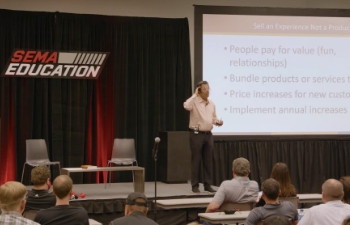SEMA News—May 2020
RETAIL BEST PRACTICES
By Mike Imlay
Retail Doldrums?
Rethinking Some Basics Can Get Your Business Bouncing Again
 Almost every retail owner will experience times when the business feels stuck in the doldrums. But if you can shift your approach in a few fundamental areas, you can soon get your business back on track as a rewarding venture. |
Getting “unstuck” is a popular small-business topic, and there’s no end to advice articles online. Most of them deal chiefly with burnout and the motivational blocks that can stymie a business owner. However, small-business expert Barry Moltz believes that there’s more to getting a retail business unstuck than motivational gimmickry—even while he concedes that it’s hard for a business owner to exude enthusiasm day in and day out.
“The problem is, how can you expect your team to be enthusiastic if you’re not?” Moltz said. “That’s why you need to have some kind of mission that is larger than whatever you sell or the service you provide.”
Success, Failure and “Bouncing”
Still, having a mission is just the starting point for getting a stuck retail operation back on course. According to Moltz, real forward movement comes from shifting your views about business in general toward a more realistic appraisal of what defines success.
“Most people think that if you just work hard, you’ll be successful, but I say that it takes a lot more than hard work,” he explained. “Your timing in the market has to be right.”
Moltz pointed to Netflix as an example. Its founders originally wanted to mail customers VHS tapes but soon realized that the videos would be too bulky, expensive and inconvenient. Then DVDs burst onto the scene, offering the perfect solution.
“Their timing was right on that—it didn’t matter how hard they were going to work,” Moltz said. “I also believe that you’ve got to have a little bit of luck with the timing. I believe that the harder you work, the more you spread your risk and the luckier you get. But ‘overnight success’ usually takes seven to 10 years.”
Which means a retail owner must also view failure from a new perspective. Moltz sees a fine line between woefully “accepting” failure versus recognizing that it’s bound to happen.
“I think you have to realize that there’s going to be failure if you are pushing the envelope of any kind of business or business model,” he said. “The key thing isn’t accepting it; the key thing is what you do once you’ve failed. I always say that you can feel really sorry for yourself, have a pity party, cheer the darkness when you fail, but you have to let go of failure. You have to say, ‘Okay, this is what’s happened.’ You may not always understand why [a tactic] failed, but you have to go on and try something else. I believe it’s these patient, iterative steps that really get to where you want to go overall from a success standpoint.”
Moltz said that business owners should embrace the concept of “bouncing,” along with that new approach to failure.
“A lot of people talk about ‘bouncing back,’” he said. “But I think that when we bounce, we don’t always bounce back. Sometimes it takes us to a different place. It’s almost like a sailboat tacking across a windy lake. You can’t go straight to your target, so you’ve got to make a decision and see what happens. If you end up to the right of where you want to be, you make another decision that pushes you to the left. You make another decision, and it pushes you farther to the left. So these small, patient, iterative steps have you kind of bouncing all over the place. But you’re always trying to go to that general target.”
Having embraced new perspectives on work, success, failure and bouncing forward, the retail owner can next tackle the deeper behaviors that often hamper an enterprise.
1. Succumbing to Daily Distractions
From his frequent speaking engagements with small-business entrepreneurs, Moltz has met many who equate being busy with being productive, missing a crucial distinction.
“Being busy is doing stuff,” he said. “Being productive is focusing on the stuff that’s really important. It’s not a time issue. It’s an attention issue.”
To overcome that tendency, many efficiency experts recommend that retail owners go to work each day armed with a full to-do list and specific action items to tick off before checking e-mail, voice messages and social media. But Moltz recommended a slightly different approach: Each day, set aside two things you have to get done to consider the day successful. Then don’t let the day unfold haphazardly.
“Shut off all the time vampires,” he advised. “For a certain part of the day, for an hour during the day, shut off all your interruptions, whether electronic or in your office or whatever. Then decide the one or two things that you’re going to get done in that hour that will really make a difference to your business. Every single time you have a hard time focusing and want to interrupt yourself, just take a minute and go back to where you were. The hardest thing is to focus your attention, because our attention span is about eight seconds now, and goldfish attention spans are nine seconds.”
2. Not Constantly Marketing
Being small operations, many retailers concentrate on serving and making sales to immediate customers, then shifting to marketing efforts when there’s downtime or sales slack off. Or perhaps they don’t like to do marketing because they hate asking people to buy things.
“They become stuck because they don’t keep their pipeline full,” Moltz said. “They just wait for customers to come in. And you can’t do that. You have to do marketing all the time.”
That is because a retailer can’t actually sell anything to people who are unready to buy.
“If I don’t have the pain or the need that your [business] solves, I’m never going to buy from you,” he said. “But as soon as I have that pain or need, you want me to think of you as a possible alternative.”
That means constantly reminding potential customers that you’re there—preferably through automated systems for email marketing, content marketing, social media or regular advertising that can track where the leads are coming from.
“There are a lot of really easy tools out there,” Moltz noted. “You can hire a consultant for an hour if you want, but it doesn’t take a lot of time. The hardest part is actually planning the content of what you’re going to send out. What I suggest is just coming up with topics. For example, one of the topics might be ‘the most replaced part on a used car.’ That might be the title of an email, and it might point to a survey or some other thing that provides that result. At the least, it reminds people that you’re an expert in this area.”
3. Failing to Leverage Staff
| Executive Summary |
It’s natural for a retail owner to watch a business get stuck from time to time. Getting back on track starts with having a sense of purpose and a proper perspective on success, failure and a concept that small-business expert Barry Moltz calls “bouncing.” With that shift in perspective, a business owner can then address three common retailer pitfalls:
In the end, success in business relies not so much on big ideas but on how a businessperson turns ideas into actions. |
A third common reason that a retail operation can sputter is a lack of delegation of critical roles and decision-making to staff. As Moltz put it, “Instead of it being more hierarchical where the employees that you hire are leveraged to make decisions and do their part in the business, your business remains stuck because you’re at the center of everybody, and every major decision goes through you. There is no leverage. Every person in the company is kind of your assistant, and that’s a problem, because unless you find leverage through employees, you don’t really have a company. You just have
a job.”
Ultimately, Moltz said, success in business relies less on big ideas and more on how entrepreneurs bring their ideas to fruition. We’ve all seen people succeed with an idea that we might have once thought of but never pursued. The difference is they did.
“That’s why business is all about the people,” Moltz emphasized. “There’s probably nothing unique that any of the readers and their businesses do that someone else couldn’t do. It’s the people executing it that make it unique.”
Barry Moltz is a small-business expert and a frequent speaker on getting businesses unstuck and related topics. He can be contacted at 773-837-8250 or through his website at www.barrymoltz.com.








